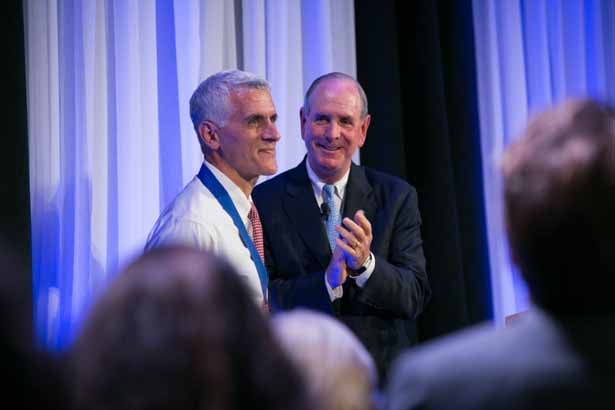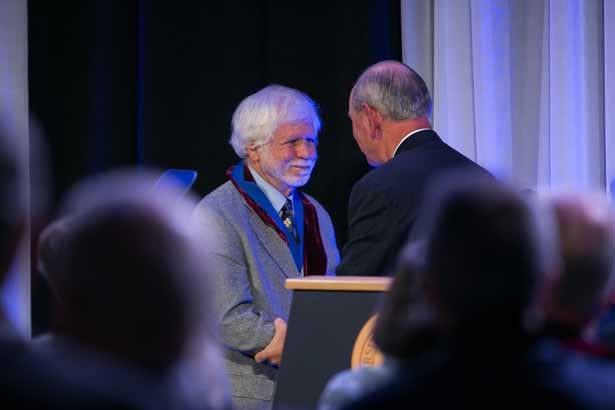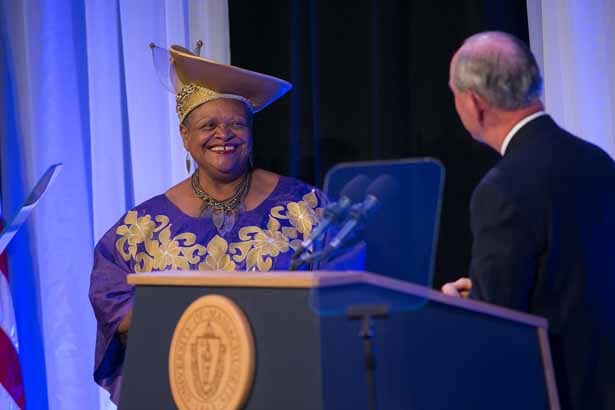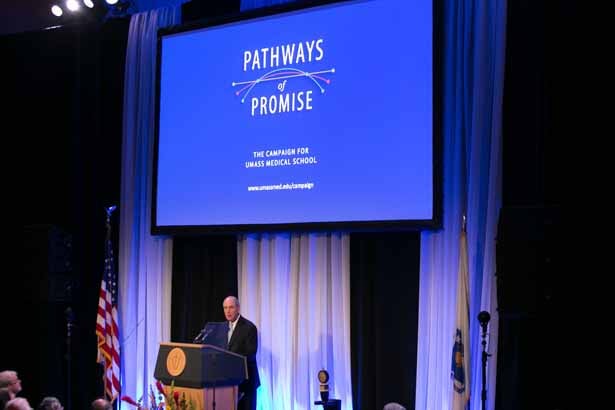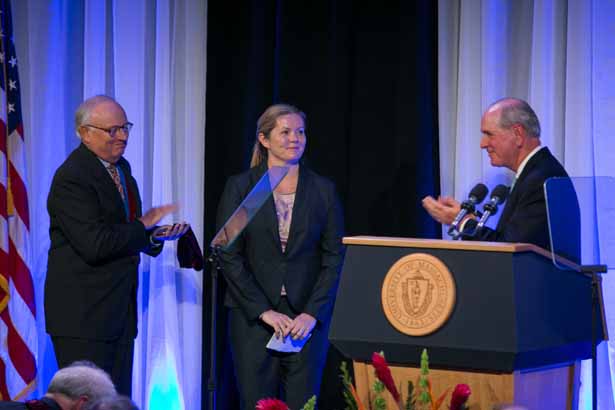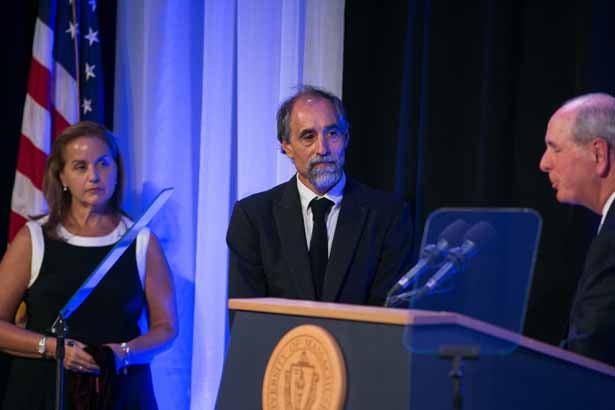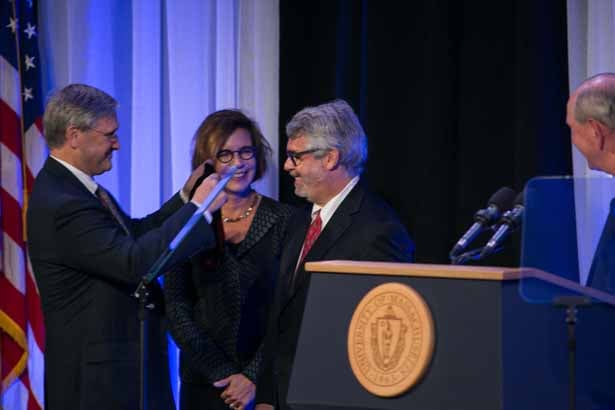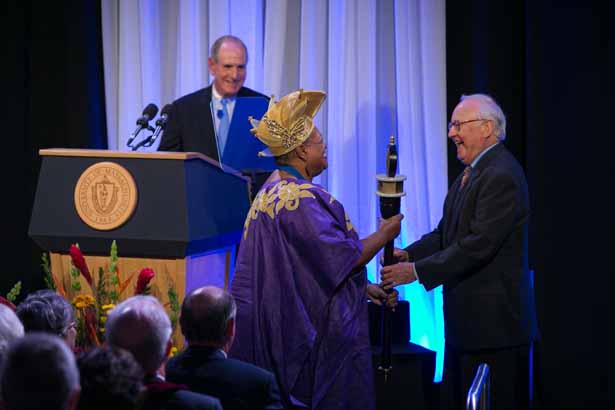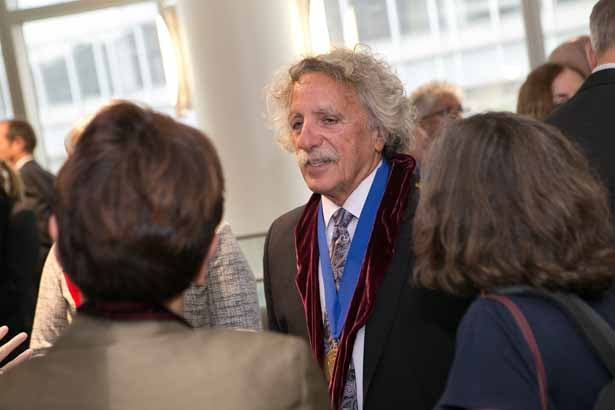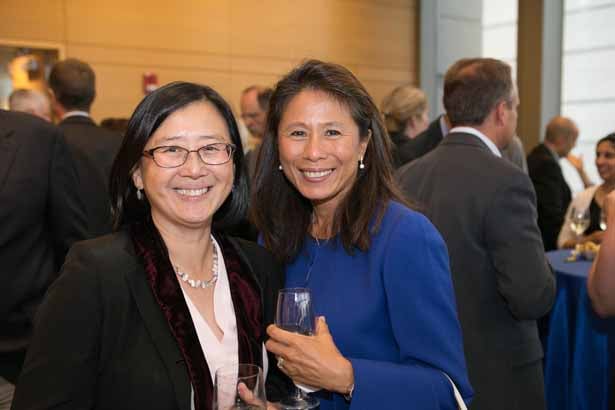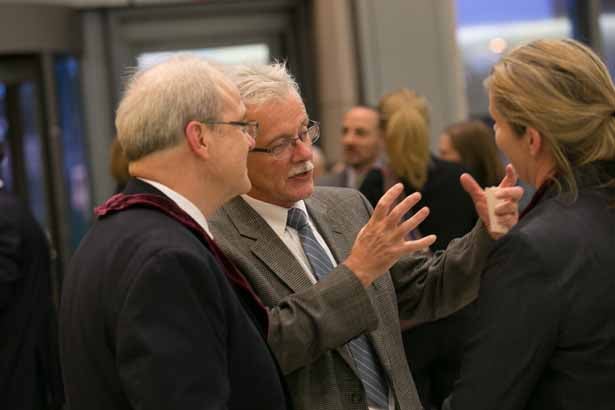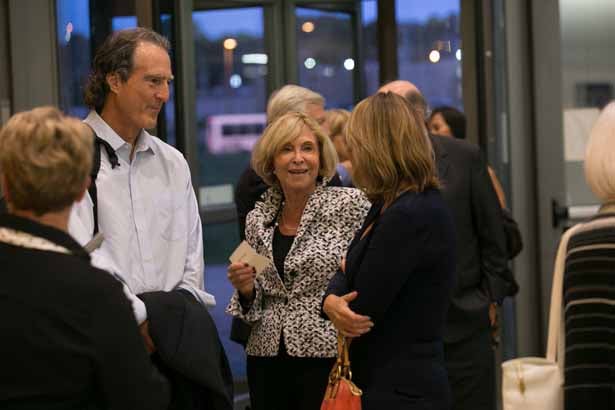In his annual Convocation address on Wednesday, Sept. 14, marking the opening of the academic year, Chancellor Michael F. Collins honored the UMass Medical School community for its continuing efforts to make the campus inclusive, responsive and influential—and well positioned for the launch of a $250 million comprehensive campaign. The campaign, Pathways of Promise, will support research, education and innovation for the next generation.
See Chancellor Collins’ full speech.
Watch a video of the Convocation and Investiture Ceremony
The highlight of Chancellor Collins’ accolades was the awarding of Chancellor’s Medals to four distinguished faculty for their exemplary teaching, scholarship, clinical excellence and service at UMass Medical School.
David Hatem, MD, professor of medicine, received the Chancellor’s Medal for Distinguished Teaching.
“Over nearly three decades at our institution, you have been the embodiment of distinguished teaching,” Chancellor Collins said. “Both architect and builder, you have played a formative role in the development and design of our curriculum while co-creating the learning communities that have become such a meaningful experiential locus for our learners. In fact, you have elevated mentoring to an essential and prominent paradigm in the lives of faculty colleagues and students alike.”
Steven Reppert, MD, the Higgins Family Professor of Neuroscience and distinguished professor of neurobiology, received the Chancellor’s Medal for Distinguished Scholarship.
“Within each of your several areas of research—the development of mammalian circadian rhythm; the elucidation of melatonin receptor structure; the explanation of circadian clock mechanisms in insects and in mammals; and the definition of sensory mechanisms underlying monarch butterfly migration—you have achieved international renown,” Collins said. “In fact, you have been described as ‘THE world leader in molecular neurobiology.’”
Deborah Harmon Hines, PhD, professor of radiology and vice provost for school services,received the Chancellor’s Medal for Distinguished Service.
“You have impacted the lives of thousands of students, many of them first-generation students and many more underrepresented in science and medicine,” Collins said. “Through your mentoring and instruction, each of your students ‘felt like [you were] speaking directly to [them] as [you] described the sacrifices it takes to get into medical school.’ Your message has provided your students ‘with the direction required to see [their] dream [through] to fruition.’ Many of those on whom you have had a major impact comment that you recognized their ‘struggle’ and in so doing, ‘focused on the strength [that they] gained from [their] individual hardships.’ Success was no longer seen as a hope; success became an expectation.”
David Drachman, MD, professor of neurology, is the recipient of the Chancellor’s Medal for Distinguished Clinical Excellence. Dr. Drachman was unable to attend the ceremony; the award will be presented to him at a later date.
Investiture
Following Convocation, three faculty members were invested as named chairs and the generous donors who created the endowments were recognized.
Jonathan Kay, MD, professor of medicine and director of research for the Division of Rheumatology, was invested as the inaugural Timothy S. and Elaine L. Peterson Chair in Rheumatology, thanks to a gift from philanthropists Timothy S. and Elaine L. Peterson, of Wellesley. A highly regarded scientist in the field of rheumatoid arthritis, Dr. Kay has led more than 50 clinical trials of novel therapies for rheumatoid arthritis, ankylosing spondylitis, gout and osteoarthritis, and published more than 120 journal articles and book chapters. Tim Peterson, who has psoriatic arthritis, is a patient of Kay’s and credits the doctor with helping him better manage pain.
“While treating patients and proffering hope demonstrate your effectiveness as a physician, the true measure of your success comes from your precise scientific knowledge and how you leverage it to positively impact the human condition. Many of your patients, including one who now stands beside you, have credited you with improving, preserving and, indeed, saving their lives,” Collins said. Tim and Elaine Peterson assisted Collins in investing Kay.
Katherine Fitzgerald, PhD, professor of medicine in the Division of Infectious Diseases and Immunology and director of the Program in Innate Immunity, was invested as the third Worcester Foundation for Biomedical Research endowed chair. These chairs were established through the generosity of donors to the Worcester Foundation for Biomedical Research Scholars Fund. The endowment celebrates the scientific legacy of the Worcester Foundation’s founders, Hudson Hoagland and Gregory Pincus, as well as the legacy of hundreds of forward-thinking leaders in the Worcester area who endowed and supported the foundation, Collins said.
Dr. Fitzgerald joined the medical school in 2001, after completing her PhD and postdoctoral training at Trinity College in Dublin. Her groundbreaking insights have helped to advance the understanding of inflammasome activation in health and disease.
“In the laboratory, you have identified and illuminated translational research pathways for therapeutic targets and clinical treatments for a host of inflammatory diseases. Such discoveries, ultimately focused on improving human health, are a distinctive hallmark of our research enterprise,” Collins said, joined at the podium by Thoru Pederson, PhD, the Vitold Arnett professor of biochemistry & molecular pharmacology. Dr. Pederson was scientific director of the Worcester Foundation for Biomedical Research when it merged with UMass Medical School. “The characteristics that define you and your research—such as your collaborative manner, commitment to mentoring, collegial style, innovative spirit, creative approach and principled nature—are distinguishing trademarks of our faculty. You are, thus, an embodiment of what makes UMass Medical School a singular place.”
Joel Richter, PhD, professor of molecular medicine, was invested as the inaugural recipient of the Arthur F. Koskinas Chair in Neuroscience, which was established thanks to the generosity of long-time Worcester resident Helen P. Koskinas and her family in support of cutting-edge research at UMass Medical School. Helen Koskinas established the Arthur F. Koskinas Chair in Neuroscience to celebrate the life and legacy of her late husband. The family previously established the Arthur F. and Helen P. Koskinas Professorship in Biochemistry & Molecular Pharmacology in 2002, which is held by C. Robert Matthews, PhD, chair and professor of biochemistry & molecular pharmacology.
Dr. Richter has made ground-breaking discoveries into Fragile X syndrome, the most common form of inherited intellectual and developmental disability. His research focuses on the molecular biology of neuronal synaptic plasticity and learning and memory; the RNA regulation of neurologic disease; translational control and RNA processing, as well as RNA-protein interactions. Richter has recently made foundational contributions to the understanding of the molecular pathology of Fragile X syndrome, identifying it as a fundamental disorder of the role of protein synthesis in neurons.
“The extension of your study of the biochemistry of the synapse to groundbreaking work into Fragile X Syndrome has been paradigm-changing in the field of neuroscience, developmental disability and autism,” Collins said, joined by Jocelyn Simon, daughter of Helen and Arthur Koskinas. “Only scientists like you who are committed, in practice and in principle, to the wonders of scientific inquiry can revolutionize an entire field of research.”
The new chairs bring to 45 the total of named professorships and chairs endowed at UMass Medical School.
Related story on UMassMedNow:
UMass Medical School announces $250 million comprehensive campaign
